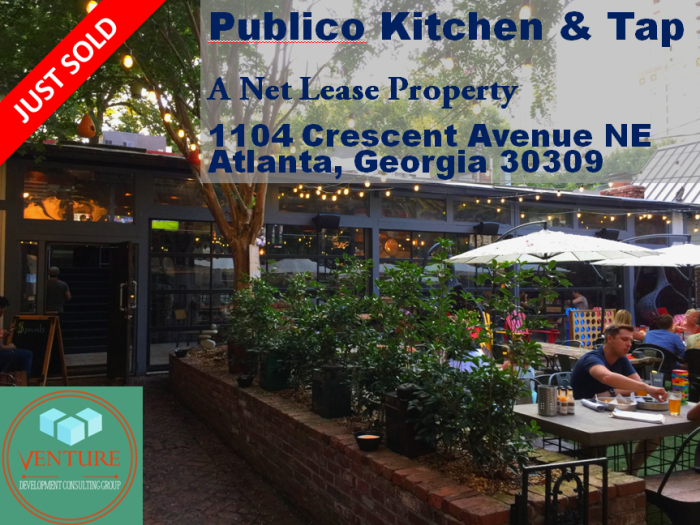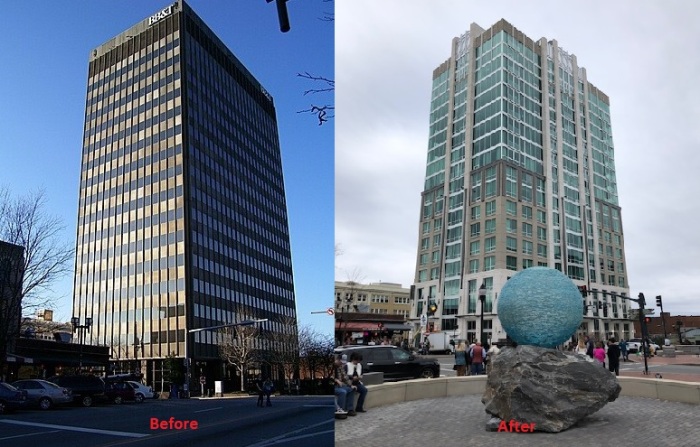 Just Sold – The property housing Publico Kitchen & Tap in the heart of Midtown Atlanta sold on April 10, 2019 for $3,900,000. The net lease property, exclusively marketed by Venture DCG, sold at over list price and with multiple offers to a buyer sourced by our team. Contact Venture DCG for your urban in-fill transactional and development consulting needs.
Just Sold – The property housing Publico Kitchen & Tap in the heart of Midtown Atlanta sold on April 10, 2019 for $3,900,000. The net lease property, exclusively marketed by Venture DCG, sold at over list price and with multiple offers to a buyer sourced by our team. Contact Venture DCG for your urban in-fill transactional and development consulting needs.
Industry News
Asheville’s Former BB&T Building Reopens After Major Renovation as The Arras – A Kimpton Hotel and Private Residences.

The Arras, Asheville, NC’s tallest building at 18 stories, has reopened after major renovation under its new name as a Kimpton Hotel and luxury condos. The building was originally built as the Northwestern Bank Building in 1965 and later became the BB&T Building. Designed in the Mies van der Rohe style which was popular at the time, the building was embraced by Ashevillians with pride since it was the first major construction project in the city since the Great Depression. However, it never truly fit into the Asheville skyline due to its height and mid-century modern façade amongst Asheville’s prevalence of Art-Deco buildings. Long time building owner and tenant, Glenn Wilcox of Wilcox Travel, partnered with John McKibbon of McKibbon Hotel Group to redevelop the property. McKibbon has recently opened other hotels in Asheville including Aloft and AC brands. The new façade with Art-Deco design elements now better fits into downtown Asheville which houses the greatest number of Art-Deco buildings in the South except for Miami Beach. The building is as beautiful on the inside as it is outside.
Gravel > A new threat to Beltline transit.
By: Ryan Gravel
Maybe I shouldn’t be surprised that we need to make our case for transit again, but I am. Honestly – we’ve been putting colored dots on maps, hand-writing community preferences on sticky-notes, and attending weeknight City Council meetings and mind-numbing Saturday morning public engagement sessions for over fifteen years now – all in support of transit on the Atlanta Beltline. John Lewis was there. And Jane Fonda helped make our video. We didn’t do it because it was fun. We did it to lay the groundwork for the future city we want to live in. Our vision was always transit on the Beltline, and our only challenge to building it was money.
To continue reading: Gravel > A new threat to Beltline transit.
The Future of Growing Cities Requires Less Parking, More Shared Rides – Urban Land Magazine
Though longer commute times alone can be a sign of a city’s appeal, metropolitan areas have to fix their traffic problems in order to prepare for the future. “The best-connected cities will win,” Chris Choa, a vice president at AECOM focused on cities and urban development, said at the recent ULI Netherlands Conference in Amsterdam.
Source: The Future of Growing Cities Requires Less Parking, More Shared Rides – Urban Land Magazine
ULI Member Outlook for Residential Communities and Neighborhoods – Urban Land Magazine
Experts in housing discuss prospects for this year, the preferences of millennial buyers, the importance of providing communities with a strong sense of place, strategies for making homes more affordable, and other trends.
Source: ULI Member Outlook for Residential Communities and Neighborhoods – Urban Land Magazine
Millennial’s Desires Changing Design of Modern MPCs – Urban Land Magazine
Developers of master-planned communities (MPCs) must prepare for the next generation of buyers who will be more sophisticated and more discerning because they will come from urban environments, attendees were told at the 2017 ULI Spring Meeting.
Source: Millennial’s Desires Changing Design of Modern MPCs – Urban Land Magazine
Why Aren’t More Small Apartment Projects Built? – Urban Land Magazine
Large, luxury apartment and condo developments have been dominating headlines and casting a big shadow over the “little guys” in rental housing. A new report released by Enterprise Community Partners and the Bedrosian Center on Governance at the University of Southern California aims to call attention to this overlooked segment of the market.
Source: Why Aren’t More Small Apartment Projects Built? – Urban Land Magazine
The Housing Paradox: Why Can’t Cities Build Enough Housing to Match Job Growth?
Why do cities with the fastest-growing economies—including Seattle, San Francisco, New York City, and Austin–suffer from a growing imbalance between job growth and housing supply?
A panel at the ULI Spring Meeting in Seattle examined why hot-market cities are failing to build enough housing for new workers, often by staggering ratios. The result is skyrocketing rents and housing prices that exacerbate regional inequality, feel unaffordable even to highly paid new workers, and strain transportation networks as the workforce moves farther out in search of affordable housing.
